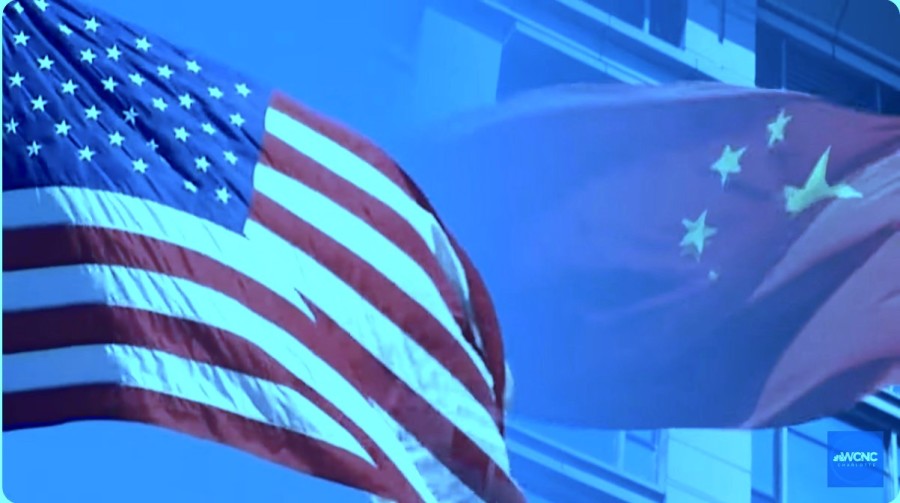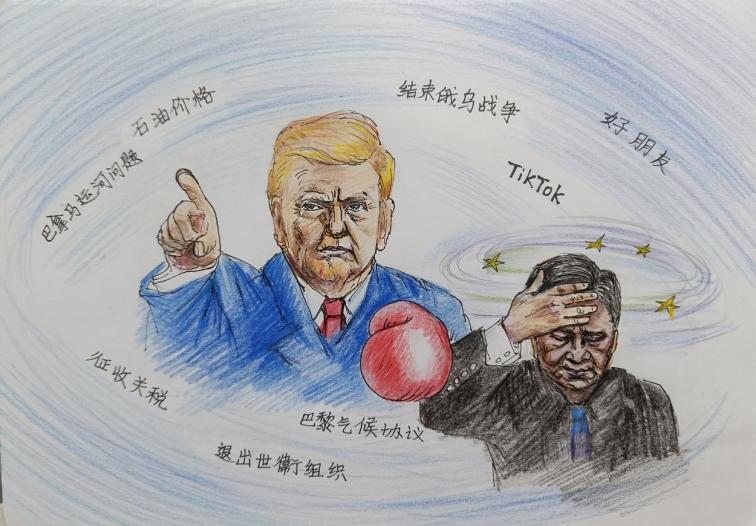U.S.-China Confrontation. (Video screenshot)
People News - According to reports from People News, after Trump assumed the presidency, his administration’s Musk Team, which aimed to downsize federal agencies, officially began its work. Thanks to their efficient investigations, scandals involving the U.S. Agency for International Development (USAID) soon came to light. These included misuse of funds to support terrorist organizations, research institutions related to the CCP virus, multiple left-wing media outlets, and other suspicious financial flows, sparking public outrage. Musk described USAID as “a rotten apple with no core” and declared it “beyond saving,” leading to it becoming the first federal agency to be delisted.
As the agency was delisted, a long-time USAID employee of Chinese descent, Wu Jia (Kathleen Wu), who actively promoted China’s Belt and Road Initiative (BRI) worldwide, was exposed by internet users.
According to Chinese media, Wu Jia is a native of Wuhu, Anhui. She graduated from Anhui University’s Foreign Languages Department in 1982 and went to the U.S. for further studies in 1989. After working at universities and consulting firms, she joined USAID in 1997. Within eight years, she transitioned from a Chinese international student to a U.S. diplomat, a career trajectory often compared to that of Deng Wendi, rumored to be a special agent for the CCP’s General Staff Department.
During her more than 20 years at USAID, Wu held various senior roles, including Chief Financial Risk Officer, Deputy Director of the Office of South and Central Asian Affairs, and Senior Advisor in the Trade and Regulatory Reform Office, where she oversaw global entrepreneurial initiatives in developing countries. In 2018, she worked in the Economic Growth, Education, and Environment Bureau’s Trade and Regulatory Reform Office. She also chaired USAID’s Asian-Pacific Employees Council twice, was recognized as a prominent Asian-American figure by the State Department, and received numerous personal and team honors from the U.S. government.
In addition to working at USAID’s Washington headquarters, Wu was also posted to U.S. diplomatic missions in Pakistan, Sri Lanka, Morocco, Ghana, and Albania, where she helped draft, formulate, and implement various foreign aid policies and programs, overseeing projects worth billions of dollars. For example, between March 2009 and May 2010, Wu was stationed in Pakistan, helping manage $7.5 billion in non-military aid, primarily focusing on U.S. assistance in Pakistan’s economic development sectors such as energy, agriculture, and finance. Notably, Pakistan is considered a key ally of China.
While excelling at USAID, Wu did not neglect serving the CCP’s interests, including promoting the Belt and Road Initiative. In 2017, China’s state-run Xinhua News Agency reported that Wu Jia, a senior advisor in USAID’s Trade and Regulatory Reform Office, stated at a U.S.-China expert and business representative seminar that the BRI had advanced rapidly over the past few years, exceeding many Americans’ expectations. She highlighted that the U.S. government and business community only recently recognized the scale and significance of the BRI. American companies, especially those in transportation, logistics, energy, and services, were eager to participate in BRI projects and were currently assessing business opportunities and risks while exploring ways to collaborate with China for mutual benefit.
It is well known that the CCP’s "Belt and Road Initiative" (BRI) is a key step in its global expansion strategy. Wu Jia’s public support for it raises the question: what does this indicate?
In addition, in 2006, China’s Sohu website published an article introducing Wu Jia, who was then the Chief Financial Risk Officer at USAID, Chairperson of the Asian-Pacific Employees Council, and Vice President of the American Friends of Anhui Association. The article described her deep attachment to her hometown. During her 2005 visit to Hefei, she promised to help find partners in the U.S. to bring tangible economic aid to Hefei.
The article also stated that Wu Jia had become a cultural ambassador between China and the U.S. In April of that year, a delegation from the Anhui Provincial People’s Congress visited the U.S., and Wu, entrusted by the "Friends of Anhui" association, hosted a grand banquet at her home to welcome the delegation. The delegation presented her with an appointment letter naming her an investment advisor for Hefei’s Luyang District to recognize her contributions to attracting investment to her hometown. This raises the question of whether her actions violated the U.S. Foreign Agents Registration Act (FARA).
It is important to note that the CCP has carried out large-scale infiltration of the U.S. over the past few decades, leading to many serious consequences. James Comer, Chair of the House Oversight Committee and a Republican congressman from Kentucky, made this clear. On March 14 of last year, he sent letters to nine Biden administration agencies requesting an investigation into the resources being used to combat the CCP’s undue influence in the U.S.
In his letter, Comer wrote: "The Chinese Communist Party has waged war on the United States without firing a single shot by targeting, influencing, and infiltrating every sector of the U.S. economy and community. We know that these coordinated efforts threaten America’s military readiness, technology sector, financial markets, agriculture, education system, and intellectual property. The lives and safety of all Americans are at risk."
Given Wu Jia’s background and ties to the CCP, could she be one of the CCP’s agents infiltrating the U.S.? If we dig deeper, in what ways might she have assisted the CCP? In an agency as troubled as USAID, could she truly remain untouched? Perhaps the Trump administration should investigate Wu Jia.
(People News original publication)









News magazine bootstrap themes!
I like this themes, fast loading and look profesional
Thank you Carlos!
You're welcome!
Please support me with give positive rating!
Yes Sure!